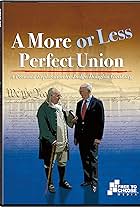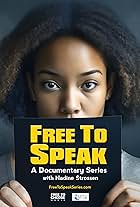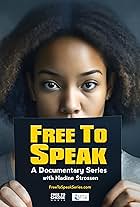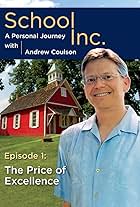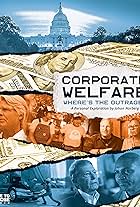Advanced search
- TITLES
- NAMES
- COLLABORATIONS
Search filters
Enter full date
to
or just enter yyyy, or yyyy-mm below
to
to
to
Exclude
Only includes titles with the selected topics
to
In minutes
to
1-23 of 23
- Hosted by Judge Douglas H. Ginsburg, a constitutional expert with 30 years of experience on the Federal Court of Appeals in Washington, DC, A More or Less Perfect Union features perspectives and interviews from constitutional experts of all stripes - liberal, conservative and libertarian - examining the key issues of liberty: freedom of religion and press, slavery and civil rights, the Second Amendment, separation of powers and more. To add context to the shaping of American governance, the series offers firsthand perspectives, including those of a diverse range of American citizens, direct descendants of those involved in pivotal civil rights cases, historians, Constitutional experts, business owners, and judges. "More than any other program Free to Choose Media has produced, A More or Less Perfect Union is relevant to audiences of every social, political, and economic background," said Free to Choose President/CEO Robert Chatfield. "The Constitution is ours as a nation and we all have an interest in protecting it." Episode one, "A Constitution in Writing," examines the struggles and compromises in the creation of the document that defines the United States of America. From the battlefield at Old Sturbridge Village, Massachusetts, to Independence Hall, Boston Harbor, and the House of Burgesses in Virginia, Judge Ginsburg ponders: Were the powerful words used by the Framers meant to be updated by courts as our nation evolves, or only by following the amendment process specified in the Constitution itself? Constitutional experts, citizens and--in dramatic recreations, the Framers themselves--weigh in on the unique document, the rule of law, the three branches of government separated to prevent tyranny, and the debate over originalism versus a living Constitution.
- In this PBS-aired documentary, explore the life and ideas of Nobel Economist and Presidential Medal of Freedom winner, Milton Friedman, through interviews with policymakers such as Estonia's Prime Minister Mart Laar, and former Federal Reserve Chairman Alan Greenspan, who said, "...very few people over the generations have ideas that are sufficiently original to materially alter the direction of civilization. Milton is one of those very few people..."
- an intriguing, two-part look at Smith, his rise to prominence and the impact of his ideas today, both economic and ethical. It's difficult to imagine that a man who lived in a world of horse drawn carriages and sailing ships would foresee our massive 21st-century global market exchange, much less the relationship between markets and morality. But Adam Smith was no ordinary 18th-century figure. Considered the "father of modern economics," Smith was first and foremost a moral philosopher. The revolutionary ideas he penned in The Wealth of Nations and The Theory of Moral Sentiments, changed the world. Noted author, economic analyst and Cato Institute Senior Fellow Johan Norberg examines Adam Smith's 18th-century ideas and their relevance to our 21st century global marketplace today. Morality and Markets is the first hour, which takes an intriguing look at Smith, his background and the evolution of his ideas, both economic and ethical. Norberg travels Europe to locales where Smith was born, educated and spent his life teaching, writing and advocating his revolutionary ideas on markets and human morality. In the second hour, Ideas That Changed The World, Norberg traces Smith's insights regarding the benefits of free trade and the nature of wealth to the present, where they are currently in operation. He talks with some of the most distinguished Adam Smith scholars, as well as leaders of some of the world's most admired companies to discover how Smith's ideas continue to be relevant and drive the global economy today.
- 20178.5 (8)TV Mini SeriesSchool Inc. is a global exploration of discovery by the late Andrew Coulson, senior fellow of education policy at Cato Institute's Center for Educational Freedom. He takes viewers on a worldwide personal quest for an answer to the question-if you build a better way to teach a subject, why doesn't the world beat a path to your door, like they do in other industries? The three-part documentary exposes audiences to unfamiliar and often startling realities: the sad fate of Jaime Escalante after the release of the feature film Stand and Deliver; Korean teachers who earn millions of dollars every year; private schools in India that produce excellent results but charge only $5 a month; current U.S. efforts to provide choices and replicate educational excellence; and schools in Chile and Sweden-in which top K-12 teachers and schools have already begun to "scale-up," reaching large and ever-growing numbers of students. Like the Cosmos and Connections series that inspired it, School Inc. takes viewers on a personal journey, led by an expert so passionate about his field that he made arrangements before his imminent death to ensure the documentary would be completed. Coulson offers his analysis with a sense of circumspection about the limits of science, as well as a sense of humor. From its surprising twists to its beautiful visuals, the series doesn't just edify, but entertains.
- Compassion fueled the creation of America's welfare system, a safety net that rescues some of the most vulnerable among us. We often hear political leaders and activists tout the system's good intentions, but what about those living on welfare? Do they think the system is working? Have good intentions delivered good results? The safety net is ideally more of a trampoline, where people hit it and then bounce back onto their feet, and into rich, fulfilling lives. But today, instead of bouncing back, too many Americans have become ensnared in the net. Of course, the system has helped some people, but the sad fact is that it typically hurts those it's supposed to help. Viewers will experience the welfare system through the eyes of those who are stuck in it. They will learn that the system's greatest cost is its human cost.
- Federal Judge Douglas Ginsburg explores the promise and enduring influence of America's Declaration of Independence, both at home and around the world. This promissory note for liberty inspired over 100 nations seeking their independence. In the United States, it influenced the abolitionist movement, the Women's Suffrage movement, and iconic civil rights figures Frederick Douglass and Dr. Martin Luther King, Jr.
- 202156m8.1 (548)TV MovieTraces Thomas Sowell's journey from humble beginnings to the Hoover Institution, becoming one of our era's most controversial economists, political philosophers, and prolific authors.
- It's been suggested that Americans would be better off if the United States was more like Sweden. Do the Swedes know something that we don't? Sweden: Lessons for America? A Personal Exploration by Johan Norberg delves into the economic and social landscape of the Swedish scholar's homeland. Join him to see that the lessons to be learned from Sweden may not be the ones you expect. The one-hour documentary follows Norberg on a journey through the history of Sweden's economic rise, from one of the poorest countries in the world to one of the most prosperous. The program illuminates key ideas and enterprises that sparked the reform and continue to help Sweden maintain its lofty economic position, including freedom of the press, free trade, new technology companies, crazy jobs and even an old Swedish superhero.
- This program features a Kenyan filmmaker whose love story of two women garnered a nationwide ban. Viewers also meet a Turkish political artist who was censored for his provocative work in the U.S., a hip-hop historian who recalls the arrest of members of 2 Live Crew for obscenity, and a student who took a lawsuit over banned books in his school all the way to the Supreme Court.
- Thirty years ago New Zealand was on the verge of economic collapse. Today, the country is a driving force in international trade, economic leadership, healthy environmental practices, and is the flagship for sustainable fishing practices. Johan Norberg examines this transition led by an unlikely alliance of farm owners and maverick politicians who broke a system of excessive privileges that was choking the nation. The one-hour documentary introduces us to the extraordinary people who've built new lives for themselves, their families, and their fellow Kiwis by seizing the economic opportunity that resulted from economic reforms.
- Skilled, spirited and hopeful people are the world's ultimate resource. Meet individuals from around the world whose lives are being transformed from the darkness of poverty through the power of their spirit, imagination, and determination - along with a good dose of economic freedom and the rule of law. Meet Victoria, in Ghana, Eusebio from Peru, workers at the Estonia Piano Company, and others.
- Episode three shows how the Constitution is under pressure today and how, through action or inaction, all three branches of government are contributing to the problem.
- When the U.S. assumed the PAX, it assumed responsibility for global order, but for how long? Just how deeply entangled should America be in the world's affairs? What alternatives are there to being the world's policemen? Is there really a downside to retreat? And in the absence of the U.S., how might global order be maintained - or decimated? In a companion documentary to America in Retreat by Wall Street Journal's Pulitzer Prize winning columnist Bret Stephens, Free To Choose Executive Editor and Cato Senior Fellow Johan Norberg examine the questions facing a nation leaning back toward isolationism.
- Noted Swedish author, commentator, and Cato Institute Senior Fellow Johan Norberg explores an inherited British bureaucracy which created layers of rules and regulations. However, globalization and economic liberalization have created fluidity between classes - and greater ambition. Norberg follows three individuals who are working to improve their lives, and in doing so, are breaking down the centuries old caste system. India is coming alive and flourishing economically. In fact, Citigroup estimates that by 2050, it will have the world's largest economy, larger than China and the United States. For many centuries, only the politically connected and elite prospered in India, while the rest of the population lived in poverty. However, since 1991, 250 million people have been lifted out of poverty and are finding new ways to flex their personal and economic power.
- On the major social and political issues of our time, economist, author, and columnist Walter Williams is one of America's most provocative thinkers. He is black, yet he opposes affirmative action. He believes that the Civil Rights Act was a major error, that the minimum wage actually creates unemployment, and that occupational and business licensure and industry regulation work against minorities and others in American business. Perhaps, most importantly, he has come to believe that it has been the welfare state that has done to black Americans what slavery could never do: destroy the black family.The story of Walter Williams' life unfolds through exclusive, on-location interviews with Williams and many others, referencing those turbulent, discriminatory events of the 1960s that so influenced his thinking and his life.
- Leading up to the onset of World War II, western democracies like Britain and France viewed a policy of appeasement toward Germany as the path of wisdom and restraint. It seemed prudent to make concessions to aggressors if it meant avoiding a bloody war. When Nazi Germany rearmed the Rhineland, annexed Austria, and seized an area of Czechoslovakia, the British and French response came in the form of paper: the Munich Agreement, which conceded these territories to Germany under the condition they make no land grabs. British Prime Minister Neville Chamberlain declared to a cheering crowd that the agreement meant "peace for our time." Concessions often bring about peace in the short term, defusing tensions for a while - but the aggressor's initial demands are not forgotten and, in fact, they are often bolstered by newfound doubts about their enemies' resolve. As such, a greater conflict ensues. This was the case in 1939 when Germany broke the still-new Munich Agreement and invaded Poland, starting World War II. The lesson of deterrence is one which is hard-learned time and time again. In this one-hour program, the insights of military historian and National Review columnist Victor Davis Hanson guide our investigation of the United States' successful deterrence of enemy aggression in the past and the efforts to sustain it in an era of rogue nations and nuclear proliferation.
- In 1980 economist and Nobel Laureate Milton Friedman inspired market reform in the West and revolutions in the East with his celebrated television series "Free To Choose." Thirty years later, in this one-hour documentary, the young Swedish writer, analyst and Cato Foundation Fellow Johan Norberg travels in Friedman's footsteps to see what has actually happened in the places Friedman's ideas helped transform. In location after location Norberg examines the contemporary relevance or Friedman's ideas in the 2011 world of globalization and financial crisis. Central to his examination are the perennial questions concerning power and prosperity, and the trade-offs between individual liberty and income equality.
- The program examines the long history of governments suppressing speech - with clear echoes of George Orwell's warning of a world without free speech. It explores personal stories from Hong Kong, North Korea and Peru, whose governments tried to suppress free speech. One Instance resulted in a monumental - and avoidable - human tragedy.
- The One True Faith looks at the once-sacrilegious beliefs of Galileo and shows the uproar caused by the Scopes Monkey Trial. The program also examines the work of Nobel Laureate Barry Marshall, who proved that ulcers were caused by bacteria, and also explores the cartoons published by Charlie Hebdo that led to a horrifying massacre.
- The thirst for energy in developing countries will only grow as economic freedom spreads. People there see how we in the west live and refuse to be left behind. In Power to the People, by Swedish economist and author Johan Norberg explores the incredible challenge this demand presents to man- and woman-kind. As costs rise and concern for climate change increases, these questions loom large: How are we going to maintain our standard of living? How do we reduce our impact on the planet? And how will we get power to ALL the people? Norberg travels the world in Power to the People to peel back the layers of this global challenge, often questioning the conventional wisdom on what works and what doesn't. His journey starts in the Moroccan bazaars of Marrakech, which functioned fine for eons without modern conveniences, but where electric lights, computers, cell phones and credit card readers are now everywhere. Even more telling is Norberg's journey to a remote Berber village in the Sahara Desert. More than half the world still cooks its food over open flames but this is rapidly changing, including here, where women now cook on gas stoves, and some even have refrigerators. The revealing program examines global efforts to solve our energy dilemma-and how even the best of intentions sometimes result in unexpected consequences. For example, Germany's decision to abolish nuclear power and increase the use of renewable energy has sent retail prices soaring, among the highest in Europe. It also resulted in an actual increase in the use of lignite coal-burning plants as the Germans discover that it takes temporary dependence on energy from fossil fuels to build a new clean energy economy. Imposing tariffs on Chinese-made solar panels to protect the German solar industry also slowed things down. In the U.S., Power to the People explores the great debate in a country whose energy consumption is now only surpassed by China. He reveals, perhaps surprisingly, how cities like New York consume far less energy per capita than the rest of the country. The controversy over America's promising new energy source in hydro fracking is also examined, as is the folly of top-down government-imposed solutions. Witness the continued federal subsidies for corn ethanol, which have sent food prices soaring and not produced the promised a renewable energy return. Although daunting, the energy challenge can be met, Norberg believes-especially if governments step back from top-down imposed solutions. From a solar facility in Morocco to wind farms in England, a hydraulic fracking site in Pennsylvania, and a trucking company in Florida that is converting its fleet to natural gas, potential new sources and solutions abound. Coal, Oil, Natural Gas, Nuclear, Hydro, Biomass, Wind, and Solar are all in the mix and all come with their own problems. As Norberg finds, the world is overflowing with energy. The sun is shining, the world is turning, the wind is blowing, and water flows downhill. The only bottleneck when it comes to energy is our ability to safely convert, store and pay for it.
- School Inc. is a global exploration of discovery by the late Andrew Coulson, senior fellow of education policy at Cato Institute's Center for Educational Freedom. He takes viewers on a worldwide personal quest for an answer to the question-if you build a better way to teach a subject, why doesn't the world beat a path to your door, like they do in other industries? The three-part documentary exposes audiences to unfamiliar and often startling realities: the sad fate of Jaime Escalante after the release of the feature film Stand and Deliver; Korean teachers who earn millions of dollars every year; private schools in India that produce excellent results but charge only $5 a month; current U.S. efforts to provide choices and replicate educational excellence; and schools in Chile and Sweden-in which top K-12 teachers and schools have already begun to "scale-up," reaching large and ever-growing numbers of students. Like the Cosmos and Connections series that inspired it, School Inc. takes viewers on a personal journey, led by an expert so passionate about his field that he made arrangements before his imminent death to ensure the documentary would be completed. Coulson offers his analysis with a sense of circumspection about the limits of science, as well as a sense of humor. From its surprising twists to its beautiful visuals, the series doesn't just edify, but entertains.
- 20177.6 (10)TV Mini SeriesSchool Inc. is a global exploration of discovery by the late Andrew Coulson, senior fellow of education policy at Cato Institute's Center for Educational Freedom. He takes viewers on a worldwide personal quest for an answer to the question-if you build a better way to teach a subject, why doesn't the world beat a path to your door, like they do in other industries? The three-part documentary exposes audiences to unfamiliar and often startling realities: the sad fate of Jaime Escalante after the release of the feature film Stand and Deliver; Korean teachers who earn millions of dollars every year; private schools in India that produce excellent results but charge only $5 a month; current U.S. efforts to provide choices and replicate educational excellence; and schools in Chile and Sweden-in which top K-12 teachers and schools have already begun to "scale-up," reaching large and ever-growing numbers of students. Like the Cosmos and Connections series that inspired it, School Inc. takes viewers on a personal journey, led by an expert so passionate about his field that he made arrangements before his imminent death to ensure the documentary would be completed. Coulson offers his analysis with a sense of circumspection about the limits of science, as well as a sense of humor. From its surprising twists to its beautiful visuals, the series doesn't just edify, but entertains.
- Personal stories of the effect of tax exemptions, subsidies, government regulations, and bailouts - all commonly used to help big business - are presented in the new documentary, Corporate Welfare: Where's the Outrage?. Hosted by Free To Choose Media Executive Editor and Cato Senior Fellow Johan Norberg, the provocative documentary examines America's system of farm subsidies, Tax Increment Financing (TIF), Big Oil subsidies, government policies, and tax breaks for big business, and offers a perspective of the 2008 financial crash from the viewpoint of a banker caught in the middle. The program takes viewers across America to talk with individuals whose lives and livelihood have been directly affected by the outrages of corporate welfare.
